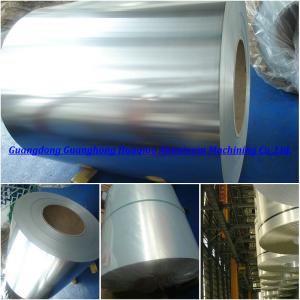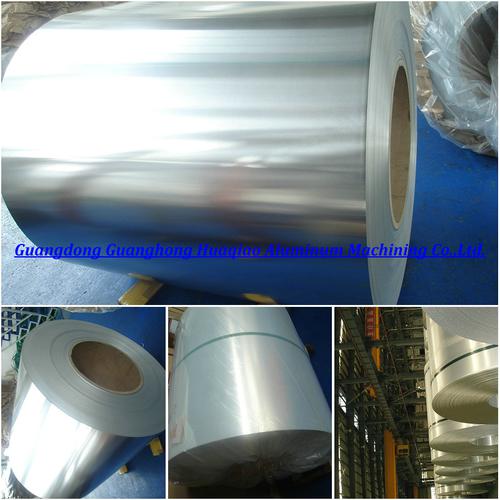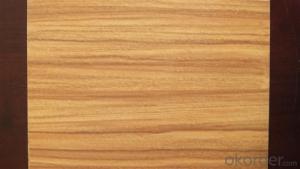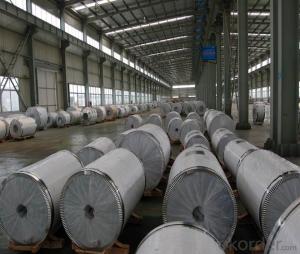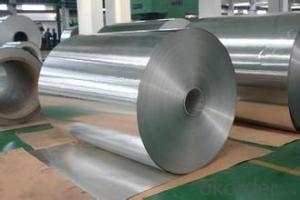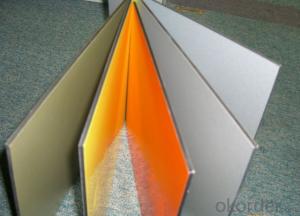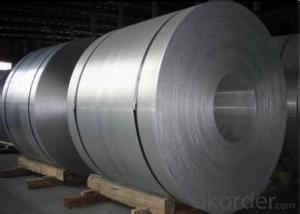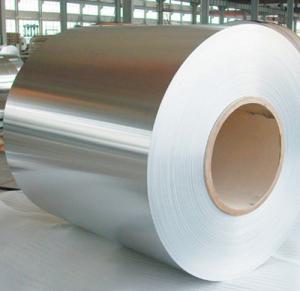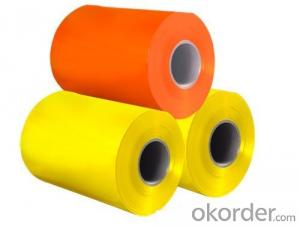Chromated Mill Finish Aluminum Coil Car Aluminum Alloy Metal
- Loading Port:
- China Main Port
- Payment Terms:
- TT OR LC
- Min Order Qty:
- -
- Supply Capability:
- -
OKorder Service Pledge
OKorder Financial Service
You Might Also Like
Color coated aluminum coil is a material with excellentacid-resistance and alkali-resistance. The coating layer is even with brightcolor to last for a very long time. It is a green decoration material with thecharacters of environment protection, flame-resistance, and groovy colors. In nowadays, the color coatedaluminum coil has become the popular material for top grade decoration. With our advance professional aluminum coated technique, wecan custom various aluminum coils ,like coated aluminum coil , Color coatedaluminum coil , embossed aluminum sheet with the color and size which youdemands.
1) Process: pre-treatment, continuous painting and baking for times.
2) Material: high quality material, aluminum sheets from South WestAluminum Industry Company in China, pre-treatment material from Henkel &Chemtell from Germany, more than 70% of PVDF coating from PPG Corp., the USAand polyester from Sweden Becker Industrial Coating Co., Ltd.
3) Our products can keep excellent quality and stability.
4) Thickness: 0.06 - 1.0mm; width: 20 - 1,590mm
Applications:
The aluminum coils are widely used in ACP/curtainpanel/honey comb panel/shutter/roofing and most of the decoration areas. Withthe superior quality and advanced management, our products had been export toEuro/North America /East Asia and many other areas and countries.
| Aluminum-plastic Composite Panel is called for short ACP or APCP. It’s a new material which is made of a series of technological process, the surface is the aluminum sheet of surface treatment and paint coating and the core is polyethylene plastic board.
|
| Aluminum Corrugated Composite Panel is full aluminum alloy composite panel which is composed of aluminum alloy front-panel, bottom plate and corrugated aluminum core vacuum.
SK coated aluminum coil, the surface is coated with PVDF, perfect weather resistance and excellent workability: various processing method of cutting, connect, bending, round bending and others. It is ideal material for aluminum corrugated composite panel. |
| The inside and outside layer of aluminum honeycomb panels are aluminum alloy sheet, intermediate sandwich material is hexagonal aluminum foil honeycomb core, honeycomb core is bonding composed of structural adhesive and aluminum alloy surface layer plate.
SK coated aluminum coil, The surface can be coated PVDF or PE by customer requested colors, the back is epoxy. It is ideal material of aluminum honeycomb panels making. |
| Metal exterior wall insulation board surface is color coated aluminum sheet, and aluminum sheet can be according to design request to choose facing design, color or roll forming for specified grain making, basically for adornment effect, and also have good weather resistance, corrosion resistance and self-cleaning. The middle layer is rigid polyurethane foam with fine warming insulation performance.
SK coated aluminum coil, The surface coated PVDF with perfect weather resistance, and also can be embossed for customer request. It is good choice for exterior wall insulation board manufacturer. |
- Q: What are the potential applications of coil-perforated aluminum coils?
- Coil-perforated aluminum coils have a wide range of potential applications due to their unique properties and capabilities. Some of the potential applications of these coils are: 1. Architectural Applications: Coil-perforated aluminum coils can be used in architectural projects for facades, cladding, and sunscreens. The perforations allow for the creation of decorative patterns and designs, while also providing functional benefits such as ventilation and light control. 2. Industrial Applications: These coils can be used in various industrial applications such as filtration systems, soundproofing panels, and heat exchangers. The perforations in the aluminum coils allow for the passage of air, sound, and heat, making them suitable for these purposes. 3. Automotive Industry: Coil-perforated aluminum coils can be utilized in the automotive industry for applications such as radiator grilles, speaker covers, and air vents. The perforations in the coils provide functional benefits like airflow, sound transmission, and aesthetic appeal. 4. HVAC Systems: These coils can be employed in heating, ventilation, and air conditioning (HVAC) systems. The perforations in the aluminum coils allow for improved airflow, which helps in efficient temperature regulation and air distribution within buildings. 5. Acoustic Panels: Coil-perforated aluminum coils can be used in the construction of acoustic panels, which are designed to absorb and reduce sound reflections in spaces like auditoriums, theaters, and recording studios. The perforations in the coils aid in sound absorption and diffusion. 6. Lighting Fixtures: These coils can be incorporated into lighting fixtures to create unique lighting effects. The perforations in the aluminum coils allow light to pass through, resulting in visually appealing patterns and designs. 7. Furniture and Decorative Applications: Coil-perforated aluminum coils can be utilized in the manufacturing of furniture, screens, partitions, and decorative elements. The perforations in the coils add a distinctive aesthetic appeal and can create interesting visual effects. Overall, the potential applications of coil-perforated aluminum coils are diverse and encompass various industries, including architecture, automotive, industrial, HVAC, acoustic, lighting, and furniture. The unique properties of these coils, such as their lightweight, durability, and aesthetic customization options, make them a versatile choice for many different uses.
- Q: We want to buy an AirBake insulated aluminum pizza pan. What is insulated aluminum? We want to make sure that it is not something toxic like the non-stick material on pans.
- AirBake is available either natural (just plain aluminum) or nonstick, which is coated with a similar material to other nonstick cookware. What's insulated about it is this: The pan is actually two layers separated by an air pocket. If you put it directly over a heating element, the lower layer heats the air inside, which heats the upper layer. A single-ply aluminum sheet will get very hot and tend to burn the pizza, because it absorbs radiant energy from the element more quickly than the pizza can conduct it away. The insulating air layer slows down the heat transfer and helps to keep your pizza from burning. So if you prefer non-non-stick cookware, get the AirBake Natural line.
- Q: I have a couple aluminum baking sheets, and when i wash them, then dry them with a towel, it turns the towel black? why is this? are these still ok to use? Ive been putting one of those silicone baking sheets or parchment paper on the sheets because of this. but i cant really do that with the cake pan. so how do i stop it from doing this?
- Aluminum reacts to anything acid and a lot of dishwashing detergents are on the acidic end of the ph scale and that causes oxidation which is the black stuff you're getting on the towel. I use commercial aluminum baking sheets when I bake. I like their heavy weight, even browning and NO burnt cookie bottoms. Hot water and a tiny, tiny bit of dishwashing detergent works to clean them. The less you expose the sheets to acidic things, the less black stuff you have. To remove it, I just take one of those sponges with a nylon scrub pad that's safe for non-stick cookware and give it a scrub. I don't soak my baking sheets or put them in the water; I put a drop of the dishwashing soap on the sponge, work it into a foam, wash and rinse quickly. Barkeeper's Friend works well on anything the dishwashing liquid won't take off also. It's normal for the type of material it is but what you use to clean them does make the problem worse. If you don't create the black stuff, you don't have the problem.
- Q: How do aluminum coils contribute to energy-efficient lighting?
- The energy efficiency of lighting systems is greatly enhanced by aluminum coils. The exceptional thermal conductivity of aluminum coils is the main advantage when used in lighting applications. Due to its high thermal conductivity, aluminum can effectively transfer heat away from the light source and disperse it into the surroundings. This property prevents lighting fixtures from overheating and ensures the longevity and efficiency of the entire system. Furthermore, aluminum coils are lightweight and have a high strength-to-weight ratio, making them perfect for creating compact and durable lighting fixtures. By utilizing aluminum coils, manufacturers can design and produce lighting products that are lighter and more efficient, thereby reducing overall energy consumption. Additionally, aluminum coils have a high reflectivity, allowing them to efficiently distribute and reflect light. This characteristic results in better light output and ensures that a larger portion of the emitted light is effectively utilized, thereby reducing energy waste. Moreover, aluminum is a highly recyclable material that can be reused and repurposed multiple times without losing its qualities. This recyclability contributes to the overall sustainability of energy-efficient lighting systems, reducing the environmental impact associated with their production and disposal. To sum up, aluminum coils contribute to energy-efficient lighting by effectively dissipating heat, reducing energy consumption through lightweight designs, optimizing light distribution, and promoting sustainability through recyclability.
- Q: What are the different types of aluminum alloy used in coil production?
- There are several different types of aluminum alloys used in coil production, including 1xxx, 3xxx, and 5xxx series alloys. These alloys offer varying levels of strength, corrosion resistance, formability, and other properties, making them suitable for different applications in the manufacturing industry.
- Q: Can aluminum coils be used in the production of electronic components?
- Yes, aluminum coils can be used in the production of electronic components. Aluminum is a versatile and widely used metal in various industries, including electronics. It offers several advantages such as lightweight, high thermal conductivity, corrosion resistance, and excellent electrical conductivity. These properties make aluminum coils suitable for applications in electronic components like capacitors, transformers, inductors, and heat sinks. The use of aluminum coils in electronic components enables efficient heat dissipation, improved performance, and reduced overall weight of the electronic devices.
- Q: Are aluminum coils suitable for marine environments?
- Yes, aluminum coils are suitable for marine environments. Aluminum has excellent corrosion resistance properties, making it a popular choice for marine applications. It forms a protective oxide layer that prevents further corrosion, making it ideal for withstanding the harsh saltwater and humid conditions found in marine environments. Additionally, aluminum coils are lightweight, durable, and easy to maintain, making them a reliable option for marine applications.
- Q: I think the use of aluminum, at the lower levels, has really hurt US born players. To give a kid a piece of metal, and expect him to use wood when drafted........ I think US should go back to wood, whatever the costs (I know the aluminum is far cheaper). Thoughts....Cheers.
- no, i have to disagree, wooden bats are extremly heavy for little league kids for one, and in high school its more enjoyable to see the ball sail with the metal bat, it might be a big adjustment, but if you wanna play in the bigs you wont let something like a wooden bat stand in the way =D
- Q: Are there any restrictions on the export or import of aluminum coils?
- Yes, there are restrictions on the export or import of aluminum coils. These restrictions can vary depending on the country and the specific regulations in place. Some common restrictions include export licenses, quotas, and tariffs. Export licenses may be required to ensure compliance with export control regulations, especially for sensitive industries or countries. Quotas may limit the quantity of aluminum coils that can be exported or imported within a specific time frame. Tariffs are taxes imposed on imported goods, which can affect the cost and competitiveness of aluminum coils in the market. Additionally, there may be restrictions related to quality standards, environmental regulations, or trade agreements between countries. It is important for individuals or businesses involved in the export or import of aluminum coils to thoroughly research and understand the specific restrictions in their respective jurisdictions. Consulting with legal or trade experts can be helpful in navigating these restrictions and ensuring compliance with applicable laws.
- Q: Is it possible to utilize aluminum coils in the packaging of food products?
- <p>Yes, aluminum coils can be used for food packaging. They are commonly used in the production of aluminum foil, which is a popular material for food packaging due to its properties such as light weight, barrier to light and oxygen, and recyclability. Aluminum foil is used to wrap food, line baking sheets, and create containers, providing a protective barrier that helps to preserve freshness and extend shelf life. However, it's important to ensure that the aluminum used meets food-grade standards to avoid any health risks.</p>
Send your message to us
Chromated Mill Finish Aluminum Coil Car Aluminum Alloy Metal
- Loading Port:
- China Main Port
- Payment Terms:
- TT OR LC
- Min Order Qty:
- -
- Supply Capability:
- -
OKorder Service Pledge
OKorder Financial Service
Similar products
Hot products
Hot Searches
Related keywords
